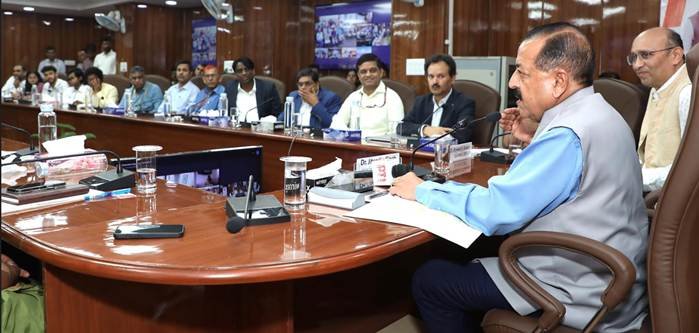More than 22,000 compliances reduced in procedures, says Goyal
A big exercise is being carried out by Central Ministries, States and Union Territories (UTs) to reduce compliance burden and simplify, decriminalize and remove redundant laws, said Piyush Goyal, Minister of Commerce and Industry, told a workshop on 28 Sept 2021.
Addressing the “National Workshop on Reducing Compliance Burden”, he pointed out that India has come a long way from red-tapism to laying the red carpet for businesses.
The workshop was organised by the Department for Promotion of Industry and Internal Trade (DPIIT).
The mindset has evolved from “not able to understand complexities” to start a business to “it’s so simple to start a business,” he said.
Also, Goyal acknowledged that numerous regulatory compliances only confused the new prospects and built hesitation in investors, “but we are creating a most conducive environment for entrepreneurs”.
The Minister said that the soft launch of the National Single Window System (NWSW) is an outstanding example of Government’s commitment to simply and rationalise things.
The NSWS portal hosts approvals across 18 Central Departments and nine States and another 14 Central depts and five states will be added by December 2021.
Goyal explained that through a participative and consultative approach with all stakeholders “we are identifying and eliminating hurdles in a time bound manner”.
More than 22,000 compliances have been reduced by Union Ministries, States and Union Territories so far. About 13,000 compliances have been simplified while more than 1,200 processes have been digitized. It may be noted that during last few years 103 offences have been decriminalized and 327 redundant provisions and laws removed.
Goyal said that the National Workshop on Reducing Compliance Burden will showcase the progress, achievements and notable initiatives under the exercise of Reducing Compliance Burden to ensure Ease of Living and Ease of Doing Business.
Ministries and States showcased iconic reforms, shared Best Practices and highlighted impact created in continuous endeavour to reduce compliance burden and improve quality of living for citizens during the workshop.
Goyal also released the ‘Stakeholders Booklet on Reduction of Compliances’ at the workshop to promote peer learning among Ministries and States/UTs to facilitate swift adoption of Best Practices for improved Service Delivery to citizens and businesses.
With the intent to ensure “Minimum Government, Maximum Governance”, the Government of India embarked on an ambitious journey to reduce burdensome compliances.
DPIIT pioneered this initiative and engaged the States/UTs and Ministries for more than two years to improve the regulatory and governance model across the country.
Some of the iconic reforms implemented by the Centre to ease compliance burden on citizens and businesses are:
1) Removal of distinction between Domestic and International OSP (other service provider) which will provide thrust to voice-based BPO and ITeS organizations in India,
2) Liberalized access to geospatial data,
3) Introduction of ‘Mera Ration’ mobile app,
4) Introduction of single step online Aadhaar validation process for 18 services associated with Driving License and Registration Certificate.
5) 46 penal provisions of the Companies Act, 2013 and 12 offences under the Limited Liability Partnership (LLP) Act, 2008 decriminalized.
6) Through business process re-engineering, the States and UTs have reduced time for granting approvals and licenses, eliminated physical touch-points and brought transparency in inspections.
7) Single window clearances for new investors have reduced the time to start operations across businesses.
It was noted that many State Governments have also maintained the momentum of continued reforms by implementing licensing reforms, computerized central random inspection system, labour reforms, initiatives to support Medium, Small and Micro Enterprises (MSMEs) and promote industrial development in the true spirit of cooperative federalism.
In July 2020, the Cabinet Secretary had written to all Ministries to set up a dedicated team to examine the Acts and Regulations under their purview and reduce the compliance burden for citizens and business activities.
The DPIIT was directed to act as a Nodal Department to coordinate this exercise of reducing compliance burden on citizens and business activities.
The objective for this comprehensive exercise is to improve ease of living and ease of doing business by simplifying, rationalizing, digitizing and decriminalizing government to business and citizen interfaces across all Ministries and States as well as Union Territories.
The exercise focus areas:
1) Eliminate compliance burden across all procedures, rules, notifications, circulars, office memorandums, etc. which merely add to time and cost without achieving any tangible improvement in governance.
2) Repeal, amend and subsume redundant laws.
3) Decriminalize laws pertaining to technical and minor non-compliance issues to eliminate constant fear of being prosecuted for trivial defaults, while retaining strict criminal enforcement for serious fraudulent offences that jeopardize and prejudice public interest.
In July-August 2020, the DPIIT shared the template of Action Plan to reduce compliance burden with all Ministries and States as well as UTs. Each Department appointed a nodal officer for coordinating the exercise for reduction of compliance burden.
So far, through a simple, transparent and time-bound exercise, various government agencies have reduced more than 22,000 compliances across Ministries, States and UTs.
As part of the exercise on reducing compliance burden, Ministries, States and UTs have implemented various initiatives that impact specific segments of citizens and businesses. #technology #information #enterprises #investment #laws /fiinews.com










